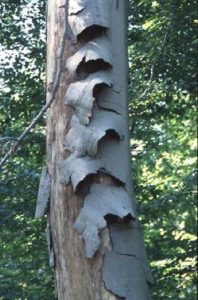University of Tübingen: research project barbastelle bat
Investigations on roosting und hunting behaviour of the barbastelle bat (Barbastella barbastellus) in the natural park Schoenbuch
Until about 1960 in many areas the barbastelle bat was quite abundant. Now this bat species is regarded as endagered by extinction und is protected throughout Europe.
Around Tübingen the barbastelle bat was last recorded about 40 years ago. In 2007 in the course of a study on bats in the newly established protection area „Steinriegelhang“ near Bebenhausen in the natural park Schönbuch and again in 2008 we succeeded to obtain echolocation calls of the barbastelle on several occasions. The barbastelle bat can be easily identified on the basis of its characteristic calls. The acoustic records suggest that this species is on the way back to its former distribution area in and around Tübingen. However, nothing is known about actual roosts. It is the try to obtain more information about this by using radio telemetry. Barbastelle bats shall be caught with nets and provided with a small transmitter. This will be attached to the dorsal fur where it usually remains for about 1-3 weeks. Due to the growth of the hair coat it will fall off after this time.



By means of the signals which are emitted by the transmitter the bats can be followed with a car and finally by walking.
Under optimal conditions in open land the signals can be caught over a distance of several kilometers. In the forest the range is usually drastically reduced to a few hundred meters. Radio telemetry is an established method in order to find unknown roosts and/or to get information about the hunting grounds of bats. The pursuit of the animals (which can reach flying speeds of 20-30 km/h or even more) at night and on narrow forest roads with the car is a hard but also exciting effort. As day roosts the barbastelle bat prefers narrow gaps, eg. behind shutters and similar structures on buildings. In forests it often can be found behind pieces of bark.

There is a hope to catch gravid or lactating females in order to find breeding colonies of the barbastelle bat. To find the accommodations of the barbastelle bats would be of great importance, as only on the basis of such knowledge measures can be met to protect and maintain such structures.
The animal foundation Wolfgang Bösche supported this project in connection with the examination of Katrin Pflüger (biology student), conducted by Prof. Dr. Ewald Müller at the university of Tübingen (faculty of biology, department of ecology of animals).
